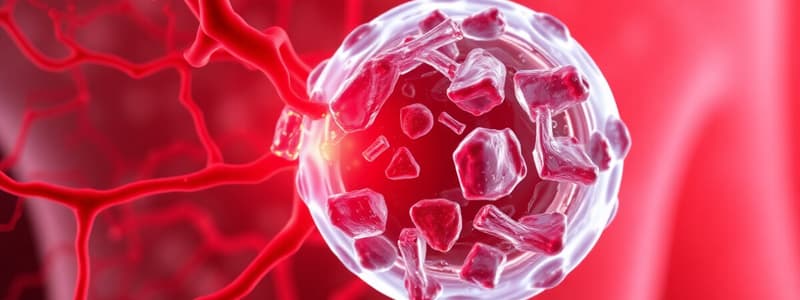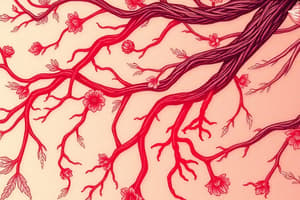Podcast
Questions and Answers
What is the initial vascular response to cellular injury?
What is the initial vascular response to cellular injury?
- Brief transient vasoconstriction (correct)
- Increased white blood cell count
- Immediate blood clotting
- Prolonged vasodilation
Which chemical mediator is primarily responsible for vasodilation during inflammation?
Which chemical mediator is primarily responsible for vasodilation during inflammation?
- Prostaglandin
- Serotonin
- Histamine (correct)
- Bradykinin
What physical signs are caused by vasodilation and increased capillary permeability?
What physical signs are caused by vasodilation and increased capillary permeability?
- Redness, heat, and swelling (correct)
- Chills and fever
- Weakness and fatigue
- Numbness and tingling
What is contained in the inflammatory exudates during the healing process?
What is contained in the inflammatory exudates during the healing process?
Which of the following is NOT a component of the vascular response to inflammation?
Which of the following is NOT a component of the vascular response to inflammation?
What physiological change occurs immediately after cellular injury?
What physiological change occurs immediately after cellular injury?
Which outcome is a direct result of increased capillary permeability during inflammation?
Which outcome is a direct result of increased capillary permeability during inflammation?
What role do chemical mediators like histamine play in the inflammatory response?
What role do chemical mediators like histamine play in the inflammatory response?
Which symptom results from the combination of vasodilation and increased capillary permeability?
Which symptom results from the combination of vasodilation and increased capillary permeability?
What type of fluid is primarily found in inflammatory exudates?
What type of fluid is primarily found in inflammatory exudates?
Flashcards
Vascular Response
Vascular Response
The initial reaction of blood vessels to cellular injury, leading to redness, heat, and swelling.
Vasodilation
Vasodilation
Widening of blood vessels, increasing blood flow to the injured area.
Capillary Permeability
Capillary Permeability
Increased ability of capillaries to allow fluid and proteins to leak into surrounding tissues.
Inflammatory Exudates
Inflammatory Exudates
Signup and view all the flashcards
Chemical Mediators
Chemical Mediators
Signup and view all the flashcards
What is the first stage of vascular response?
What is the first stage of vascular response?
Signup and view all the flashcards
What causes vasodilation in vascular response?
What causes vasodilation in vascular response?
Signup and view all the flashcards
Why is capillary permeability important in the vascular response?
Why is capillary permeability important in the vascular response?
Signup and view all the flashcards
What are the primary signs of inflammation?
What are the primary signs of inflammation?
Signup and view all the flashcards
What are inflammatory exudates composed of?
What are inflammatory exudates composed of?
Signup and view all the flashcards
Study Notes
Vascular Response to Injury
- Initial response to cellular injury is a brief, transient vasoconstriction.
- Release of chemical mediators (e.g., histamine) triggers vasodilation and increased capillary permeability.
- Vasodilation and increased capillary permeability lead to redness, heat, and swelling.
- Inflammatory exudates—a fluid containing plasma proteins and albumin—form.
- Cellular injury triggers a brief, transient vasoconstriction.
- Release of chemical mediators like histamine causes vasodilation and increased capillary permeability.
- Vasodilation and increased capillary permeability cause symptoms of redness, heat, and swelling.
- Inflammatory exudates are composed of serous fluid, containing plasma proteins and albumin.
Studying That Suits You
Use AI to generate personalized quizzes and flashcards to suit your learning preferences.




